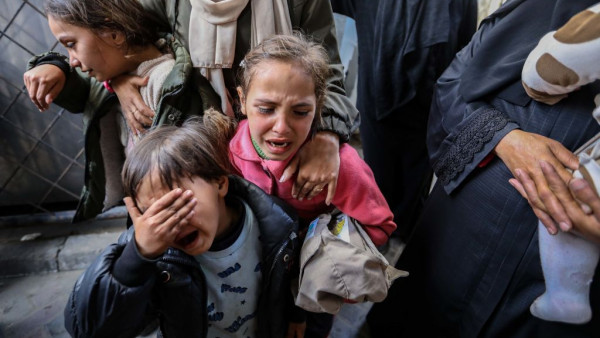The war has killed over 36,439 people, including more than 15,438 children, the media office said, adding that over 17,000 children were orphaned with the death of one or both parents [Getty]
More than 3,500 children are at risk of death in Gaza due to Israel’s total besiegement of the strip stopping the flow of much-needed aid resulting in acute food shortages and lack of nutritional supplements, the Palestinian media office has said on Monday.
The children, all of whom are aged under five, suffered from advanced malnutrition, including weight loss, loss of muscle mass, and decreased physical strength, endangering their survival, the statement said.
They urged global action to ensure aid enters the strip and an end to Israel’s onslaught.
The children also lacked access to essential services, including regular medical checks related to their early development as well as routine immunisations, which will “worsen their condition”, the statement said, describing the situation as “catastrophic” and “dangerous”.
“Children in the Gaza Strip need immediate and fundamental solutions to all the crises they face systematically from the Israeli occupation,” the statement said.
“This includes providing food, healthcare, nutritional supplements, and vaccinations, along with specialised children’s food and milk.”
The statement also highlighted the need for advanced psychological care due to “the daily horrors [the children] have witnessed” amid Israel’s onslaught on the strip, which began in October 2023.
The war has killed over 36,439 people, including more than 15,438 children, the media office said, adding that over 17,000 children were orphaned with the death of one or both parents.
“We strongly condemn the continuation of the genocide and crimes against humanity committed by Israel, supported by the US administration, particularly targeting children with killing, amputation, injury, starvation, and deprivation of the right to treatment and healthcare, as well as food,” the statement said, adding that the situation is worsened by forced displacement.
The statement called for the opening of the Rafah and the Kerem Shalom crossings to allow aid to enter, including children’s milk and food.
Aid flows into the enclave slowed to a trickle since Israel launched its offensive on the southern city of Rafah in early May and took control of the Palestinian side of the city’s border crossing with Egypt.
On Friday, Jordan announced it will host an emergency summit on 11 June to coordinate a humanitarian response to the war in Gaza.
The gathering at the Dead Sea resort, which is being jointly organised with Egypt and the United Nations, will bring together aid agency chiefs and heads of donor governments.
It “seeks to identify ways to bolster the international community’s response to the humanitarian catastrophe in the Gaza Strip”, the Jordanian Royal Court said in a statement.
It will also address “operational and logistical needs” and push for “a collective coordinated response” to the crisis in Gaza.
“The war in Gaza is causing extreme suffering for the entire population of… with the threat of famine, widespread trauma, and unprecedented levels of destruction, as well as lack of access to food, water, shelter or medicine,” it added.
US Secretary of State Antony Blinken acknowledged that the humanitarian situation was “dire” in Gaza in comments on Friday.
His comments came just a day after USAID chief Samantha Power quoted aid workers as saying that the “conditions are worse now than ever before” in Gaza.
“The humanitarian situation remains dire for people in Gaza,” Blinken told reporters in Prague when asked about Power’s remarks.
“We’ve seen changes – some positive changes – but the net effect is not there,” he said.
“We’re not just measuring inputs, we’re measuring impact. And yes, the impact remains insufficient in terms of addressing the acute needs of children, women and men in Gaza,” Blinken said.
Washington has built a temporary pier into Gaza at a cost of at least $320 million, but it was damaged in poor weather, suspending deliveries.


